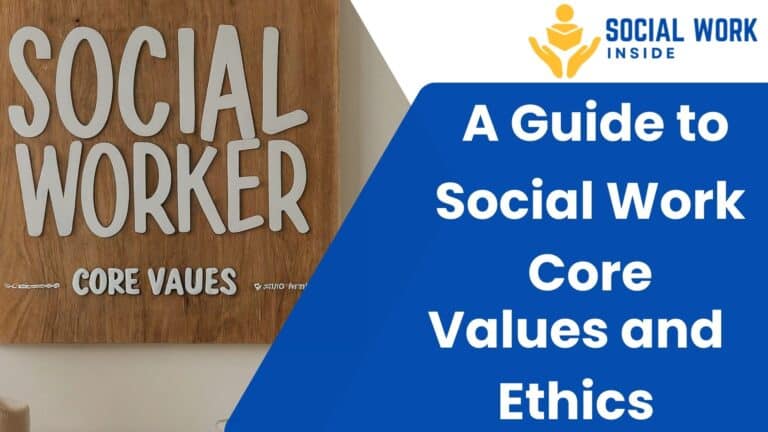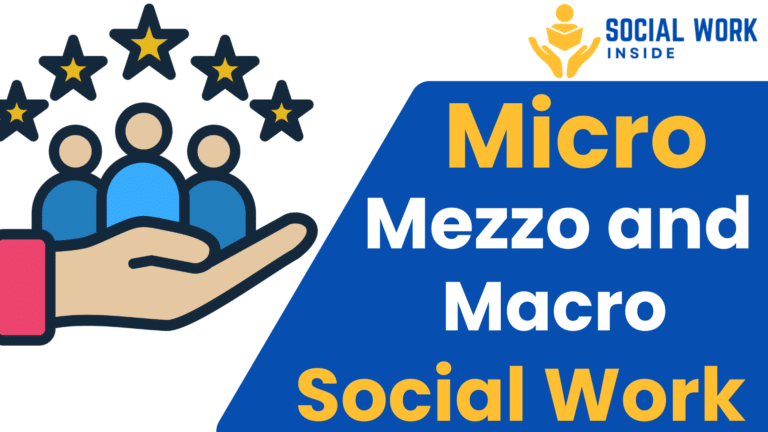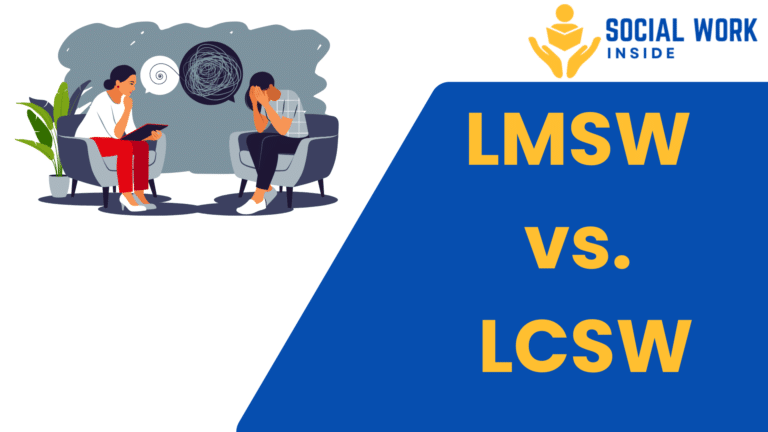Introduction to Psychosocial Development Theory in Social Work
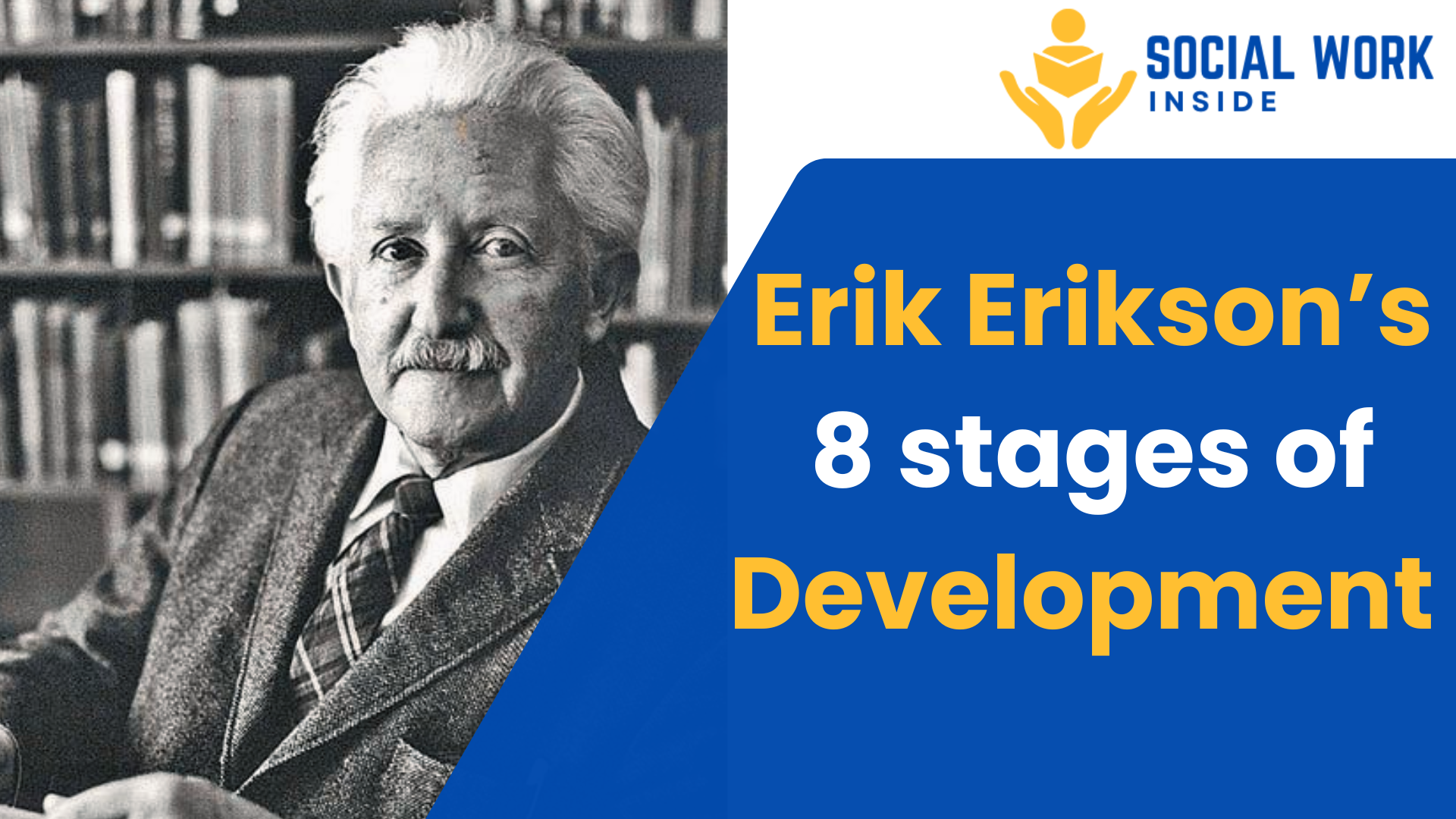
If you are pursuing your Bachelor’s Degree in Social Work (BSW) or Master’s Degree in Social Work (MSW), your curriculum has likely emphasized the critical role of theories in shaping effective practice. Social work theories serve as guiding frameworks, informing how professionals assess and engage with individuals, families, groups, and communities. They equip social workers to predict behaviors, interpret complex situations, and design interventions rooted in evidence and ethical values. Among these foundational theories, Erik Erikson’s psychosocial development theory stands out for its lifespan perspective, offering insights into how individuals navigate challenges and cultivate resilience across eight distinct stages of life.
This article explores Erikson’s theory in depth, breaking down its core assumptions, key stages, and practical applications in social work settings. You’ll discover how this theory helps practitioners understand client behaviors, foster growth, and address unresolved developmental conflicts. We’ll also examine its strengths, limitations, and cultural considerations, ensuring you gain a balanced perspective. For those inspired to dive deeper, a list of recommended books and online resources is included at the end. Whether you’re preparing for an exam, refining your practice skills, or simply curious about human development, this guide will illuminate how Erikson’s timeless ideas remain relevant in empowering clients today.
What is Psychosocial Development Theory?
Erik Erikson, a visionary psychologist, believed that life is a journey of endless possibilities. Unlike theories that focus only on childhood, he celebrated growth at every stage of life—from giggles in a crib to wisdom in old age. His theory splits life into eight exciting stages, each with its own mission to conquer. Think of them like levels in your favorite game: every victory unlocks new strengths and joys!
Erik Erikson’s 8 stages Psychosocial Development Theory
1. Trust vs. Mistrust (Infants)
When caregivers respond warmly to a baby’s needs—through cuddles, feeding, and comfort—the infant learns the world is safe. Trust becomes their foundation for future relationships. Without consistent love, fear or anxiety may linger, but social workers help rebuild this trust at any age!
2. Autonomy vs. Shame (Toddlers)
Toddlers thrive when encouraged to explore (“Let’s pick your shoes!”). Celebrating their tiny victories—like pouring juice or building towers—builds confidence. Harsh criticism can create shame, but patience helps them feel capable and proud!
3. Initiative vs. Guilt (Preschoolers)
Preschoolers burst with imagination, creating games and “helping” adults. When we cheer for their ideas (“Great spaceship drawing!”), they learn leadership. Scolding curiosity (“Don’t make a mess!”) may trigger guilt, but playfulness restores their spark!
4. Industry vs. Inferiority (Kids)
School-aged kids compare skills in class or sports. Praising effort (“You practiced hard!”) fuels pride. If they feel “less than,” they might doubt themselves—but mentors help them find their unique superpower, whether math, art, or kindness!
5. Identity vs. Confusion (Teens)
Teens experiment with styles, beliefs, and hobbies to answer, “Who am I?” Supporting their exploration—through clubs, art, or volunteering—helps them find their voice. Without guidance, confusion may arise, but encouragement turns angst into self-discovery!
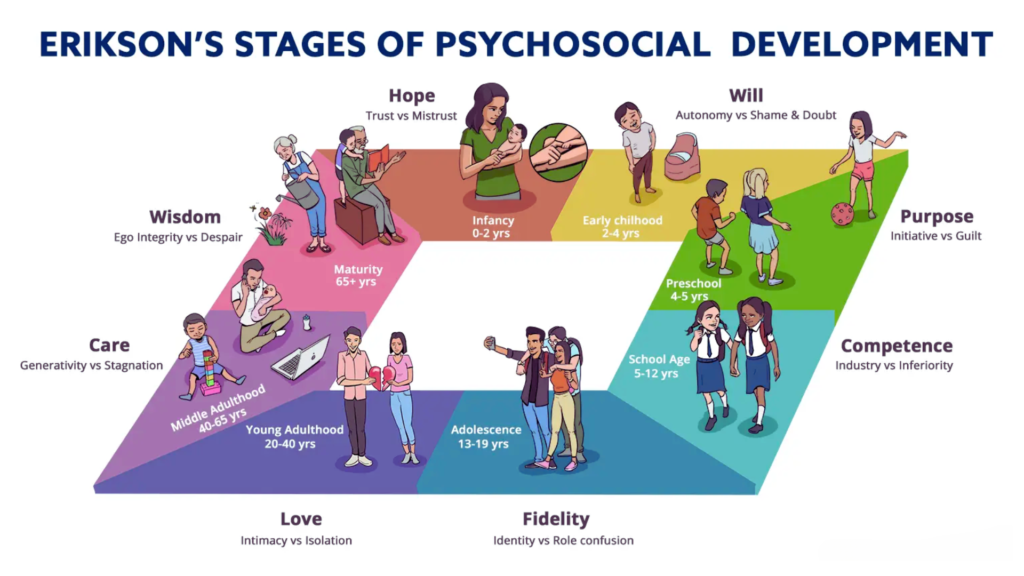
6. Intimacy vs. Isolation (Young Adults)
Young adults seek deep bonds with friends and partners. Opening up can feel scary, but courage leads to love and belonging. Fear of rejection may cause loneliness, but healthy risks create lifelong connections!
7. Generativity vs. Stagnation (Adults)
Adults shine by guiding others—raising kids, mentoring, or volunteering. Sharing wisdom brings purpose. Without this, they might feel stuck, but small acts of generosity reignite joy and legacy!
8. Integrity vs. Despair (Seniors)
Seniors reflect on life’s journey. Celebrating triumphs (“I overcame so much!”) brings peace. Regrets may cause sadness, but storytelling or mentoring helps them see their value. Every gray hair is a badge of resilience!
The Bright Side: Erikson reminds us that no struggle is final! With support, people can revisit past stages, heal old wounds, and grow stronger. Every challenge is a chance to rewrite your story with hope and courage.
What is Social Learning Theory in Social Work
Assumptions of Psychosocial Development Theory
Erikson’s theory rests on several core assumptions: human development occurs in a predetermined sequence of eight stages across the lifespan, each marked by a psychosocial “crisis” that must be resolved for healthy growth. It assumes social relationships and cultural contexts profoundly shape identity, behavior, and emotional well-being. Additionally, Erikson posited that unresolved conflicts in earlier stages can hinder progress in later ones, but individuals retain the capacity to revisit and address past challenges with support. Finally, the theory emphasizes that development is driven by both biological maturation and social experiences, creating a dynamic interplay between individual needs and societal expectations.
Applications of Psychosocial Development Theory
Client Assessment: Social workers use the stages to identify unresolved conflicts (e.g., trust issues in adults or identity struggles in teens).
Stage-Specific Interventions: Tailor strategies to developmental needs (e.g., play therapy for preschoolers or life reviews for seniors).
Strengths-Based Practice: Highlight clients’ past successes to build resilience and self-efficacy.
Cultural Adaptations: Modify approaches to align with clients’ familial or community values.
Preventive Programs: Design school or community initiatives to support healthy development (e.g., mentorship for at-risk teens).
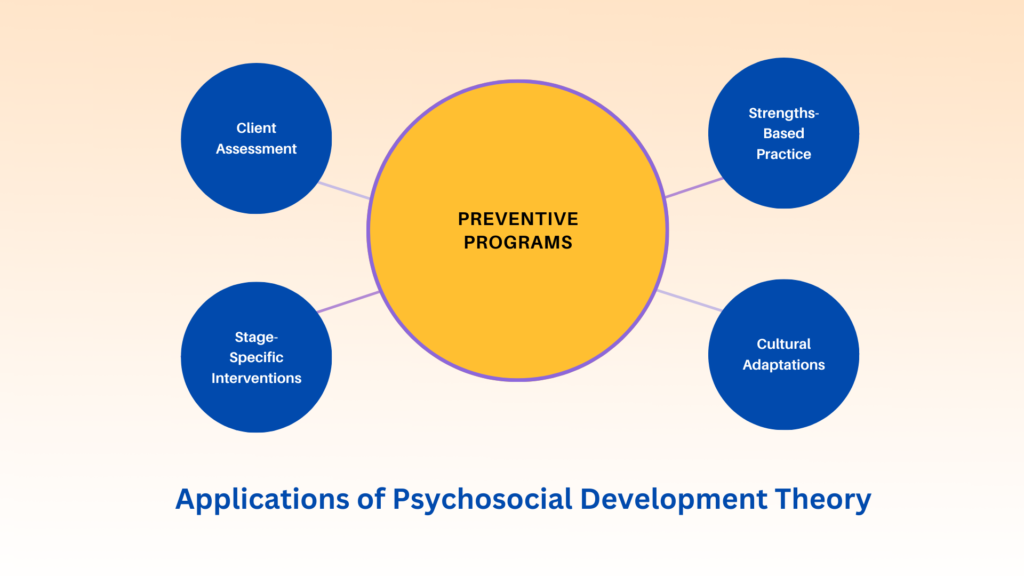
Strengths and Weaknesses of Erikson’s theory
Criticism
While Erikson’s theory has inspired countless helpers and adventurers, it’s important to grow and improve ideas over time! Some critiques remind us to celebrate diversity: his Western-centric framework encourages us to add more global perspectives, like cultures where identity shines through community bonds. Critics gently nudge us that life isn’t always a straight path—sometimes we loop back to earlier challenges, and that’s okay! While the theory leans on real-life stories over lab data, this opens doors for future scientists to mix creativity with research. Lastly, focusing on middle-class experiences invites us to collaborate with marginalized groups, ensuring everyone’s story is heard. Together, we can make this theory even brighter and more inclusive!
Strengths
Erikson’s theory remains widely respected for its lifespan perspective, which validates growth at all ages. Its accessible framework helps social workers intuitively understand client behaviors and histories. The emphasis on social context bridges individual struggles with broader cultural influences, promoting holistic care. Finally, its optimistic view of resilience—that past wounds can heal—empowers clients and practitioners to foster hope and transformation.
Key Concepts: Celebrate Growth and Connection!
Every Challenge is a Gift
Those “crises” in each stage? They’re not scary—they’re opportunities! For example, when a toddler proudly says, “I did it!”, they’re building lifelong confidence. Social workers help people see setbacks as setups for comebacks.
We Grow Together
Family hugs, high-fives from friends, and cheers from teachers shape who we become. Even small acts of kindness—like a smile from a neighbor—can spark joy and resilience!
Teens: Heroes of Self-Discovery
The teen years are a celebration of curiosity! Trying new hobbies, joining clubs, or volunteering helps teens uncover their superpowers. Social workers cheer them on, saying, “You’ve got this!”
6 Important Theories in Social Work
Life is a Beautiful Puzzle
Each stage connects like pieces of a puzzle. A child who learns teamwork in school (Stage 4) becomes a teen who leads group projects (Stage 5). Every skill builds a brighter future!

How Does Psychosocial Development Theory Apply to Social Work?
Social workers are like gardeners, nurturing growth wherever they go! Here’s how they use Erikson’s theory to help people bloom:
In Schools: A social worker might notice a shy student (Stage 4) and start a “Talent Tuesday” club where everyone shares a skill. Soon, that student is grinning as they teach origami!
With Teens: For a teen exploring their identity (Stage 5), social workers might host a “Passion Fair” with booths for coding, dance, gardening, and more. Discoveries await!
In Senior Centers: Older adults (Stage 8) might join a “Life Legacy” group, painting or writing about their adventures. Their stories inspire younger generations!
Strengths Spotlight:
Social workers focus on what’s right with people, not what’s wrong. A teen who moved often might be praised for their adaptability: “You’re a courage champion!”
Real-Life Wins: Stories of Hope and Triumph
Story 1: From Fear to Friendship
Lila, age 4, was nervous in her new foster home. Her social worker, Ms. Amy, brought a fluffy teddy bear named “Brave” to their visits. They read stories about courage and drew pictures of superheroes. Slowly, Lila started giggling and making friends at daycare. Today, she even helps new kids feel welcome—proof that trust can bloom with love!
Story 2: The Artist Within
Jaden, 14, felt lost until his social worker, Mr. T, noticed his doodles of dragons. He signed Jaden up for a comic-book workshop. Now, Jaden’s art is displayed at the library, and he grins, “I’m a storyteller!”
Story 3: Grandpa’s Garden of Wisdom
Mr. Lee, 70, thought retirement meant the end of adventures. His social worker, Maria, helped him plant a community garden. Now, he teaches kids to grow veggies and shares tales of his youth. “I’m a farmer and a teacher!” he laughs.
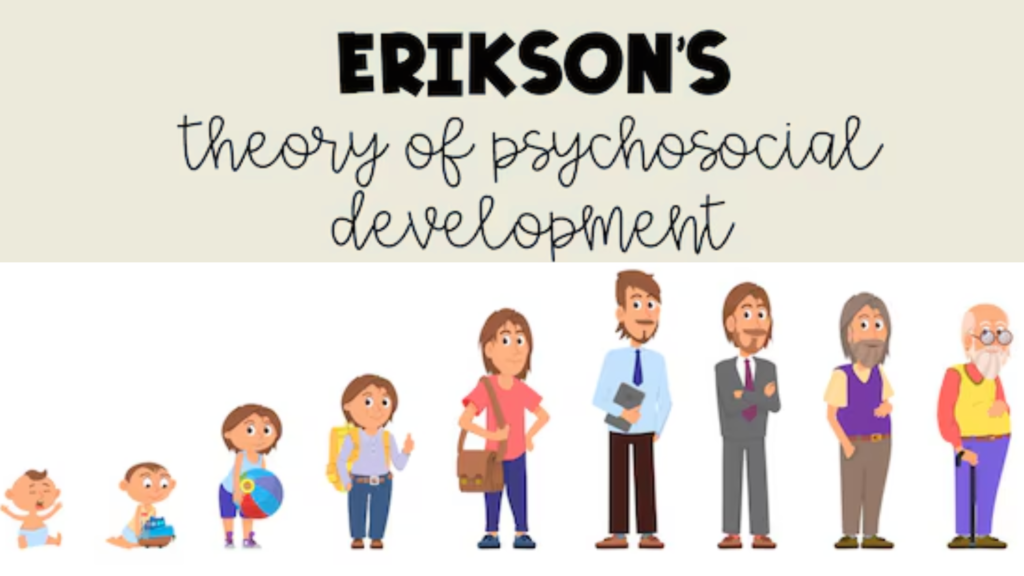
Turning Challenges into Cheers
Erikson’s theory isn’t perfect—and that’s okay! Social workers mix it with other tools to fit everyone’s unique journey. For example:
Cultural Pride: In cultures where family comes first, social workers celebrate teamwork over individual goals.
Flexible Stages: Life isn’t a straight line! A parent might work on intimacy (Stage 6) while raising kids (Stage 7). Social workers say, “Let’s grow at your pace!”
Summary and Resources for Further Learning
Books:
Childhood and Society – Erik H. Erikson
Identity: Youth and Crisis – Erik H. Erikson
The Life Cycle Completed – Erik H. Erikson & Joan M. Erikson
Erikson’s Stages of Development: A Guide for Parents and Educators – Clifford Drew
Theories of Developmental Psychology – Patricia H. Miller
Identity Development: Adolescence Through Adulthood – Jane Kroger
Human Development: A Life-Span View – Robert V. Kail & John C. Cavanaugh
Erikson on Development in Adulthood – Carol Hren Hoare
The Erik Erikson Reader – Robert Coles (Editor)
Adolescence and Emerging Adulthood – Jeffrey Jensen Arnett
Online Resources:
Simply Psychology – Erikson’s Stages Explained
American Psychological Association – Lifespan Development Resources
Social Work Today – Applying Erikson in Practice
Erikson Institute – Research and Training
TED-Ed – Animated Overview of Psychosocial Stages
Conclusion
Erikson’s theory teaches us that life is a canvas waiting for your vibrant colors. Every challenge is a brushstroke of courage, every connection a splash of joy. Social workers use this theory to remind people: You are strong. You matter. Your story is amazing.
So next time you face a tough day, ask: What can I learn here? Maybe you’re building trust, discovering a passion, or inspiring others. And remember—asking for help is like saying, “I’m ready to grow!”


